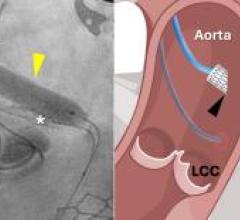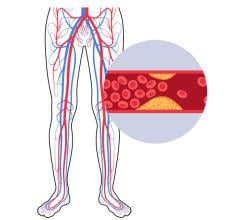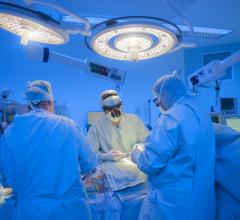
November 3, 2016 — Coronary artery bypass (CABG) surgery is the standard treatment for revascularization in patients with left main coronary artery (LMCA) disease, but use of percutaneous coronary intervention (PCI) for this indication is increasing. Findings from the Nordic–Baltic–British Left Main Revascularization Study (NOBLE) trial found that despite similar mortality, the five-year risk of major adverse events was higher after PCI compared to CABG for the treatment of unprotected LMCA disease.
Findings were reported at the 28th annual Transcatheter Cardiovascular Therapeutics (TCT) scientific symposium, Oct. 29-Nov. 3 in Washington, D.C. Sponsored by the Cardiovascular Research Foundation (CRF), TCT is the world’s premier educational meeting specializing in interventional cardiovascular medicine. The study was also published simultaneously in The Lancet.
The NOBLE Trial was presented immediately after the EXCEL Trial during the TCT late-breaking trials, which showed PCI and CABG were not significantly different. The discrepancy in the results of the two trials appear to be due to different stents being used in the two trials — EXCEL used the Abbott Xience V (with a strut thickness of about 80 microns) and NOBLE used the Biosensors BioMatrix Flex stent (with a thicker stent strut of 120 microns). The patient populations between the two trials were different, with EXCEL having sicker patients, increased numbers of diabetics and higher Syntax scores. NOBLE included patients with stable angina patients who were much less sick than EXCEL's patients. Read the results of the EXCEL Trial.
The NOBLE trial is a prospective, randomized, open label, clinical, non-inferiority trial that was conducted at 36 sites in Latvia, Estonia, Lithuania, Germany, Norway, Sweden, Finland, the United Kingdom and Denmark. Eligible patients had stable angina pectoris, unstable angina pectoris or non-ST elevation myocardial infarction. The primary endpoint was major adverse cardiac or cerebrovascular events (MACCE) — a composite of all-cause mortality, non-procedural myocardial infarction, any repeat coronary revascularization and stroke.
The original primary endpoint was evaluation of non-inferiority of PCI to CABG assessed by MACCE at two years follow-up in the complete study cohort. Due to lower than expected endpoint rates, the primary endpoint assessment was ultimately changed to a median follow-up of three years.
A total of 1,201 patients were randomized 1:1 to PCI (598) or CABG (603), and 592 in each arm entered analysis by intention to treat. Kaplan-Meier five-year estimates of MACCE were 28.9 percent for PCI (121 events) and 19.1 percent for CABG (81 events), [HR 1.48 (95 percent CI 1.11-1.96)], exceeding the limit for non-inferiority and demonstrating superiority of CABG over PCI (P=0.0066). As-treated estimates were 28.1 percent versus 19.2 percent [HR 1.55 (95 percent CI 1.18-2.04), P=0.0015]. Comparing PCI with CABG, five-year estimates were 11.6 percent versus 9.5 percent [HR 1.07 (95 percent CI 0.67-1.72), P=0.7701] for all-cause mortality; 6.9 percent versus 1.9 percent [HR 2.88 (95 percent CI 1.40-5.90), P=0.0040] for non-procedural myocardial infarction; 16.2 percent versus 10.4 percent [HR 1.50 (95 percent CI 1.04-2.17), P=0.0315] for any revascularization; and 4.9 percent vs. 1.7 percent [HR 2.25 (95 percent CI 0.93-5.48), P=0.0731] for stroke.
“Our findings of similar mortality but higher rates of myocardial infarction and repeat revascularization in patients undergoing PCI compared to CABG are consistent with previous studies of coronary revascularization in patients with LMCA disease,” said Evald H. Christiansen, M.D., Ph.D., lead researcher from Aarhus University Hospital, Skejby in Denmark. “However, the low mortality following treatment in both groups demonstrates that modern revascularization techniques can lead to excellent survival in stable LMCA patients. Further, the increased rates of non–procedural myocardial infarction, repeat revascularization and stroke associated with PCI are important considerations in selecting the optimal treatment for individual patients.”
The NOBLE trial was funded by Aarhus University Hospital and an institutional research grant from Biosensors. Christiansen reported receiving institutional grants from Biosensors.
For more information: www.thelancet.com


 January 15, 2026
January 15, 2026 









